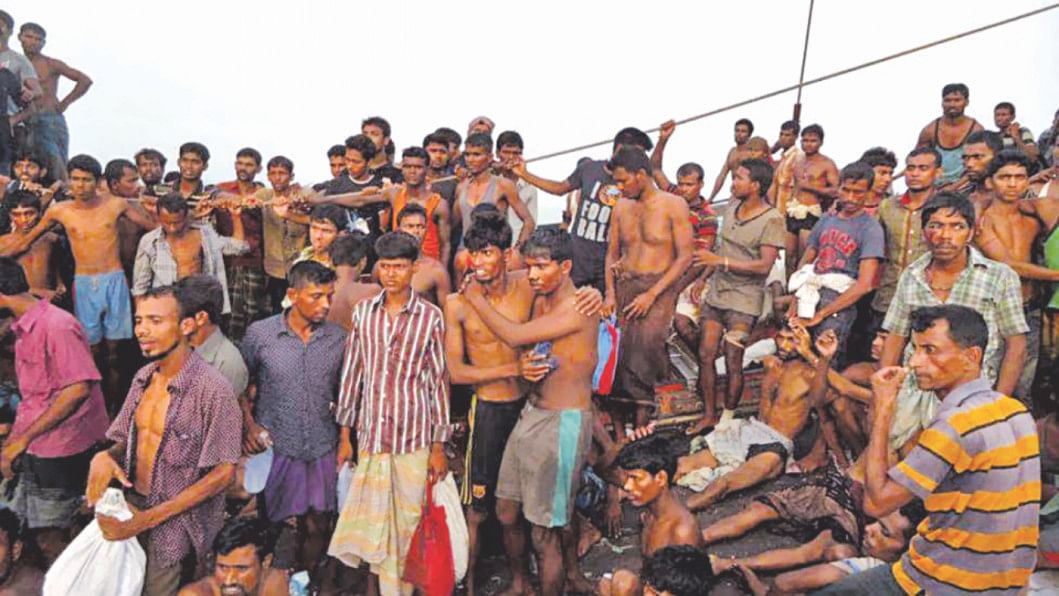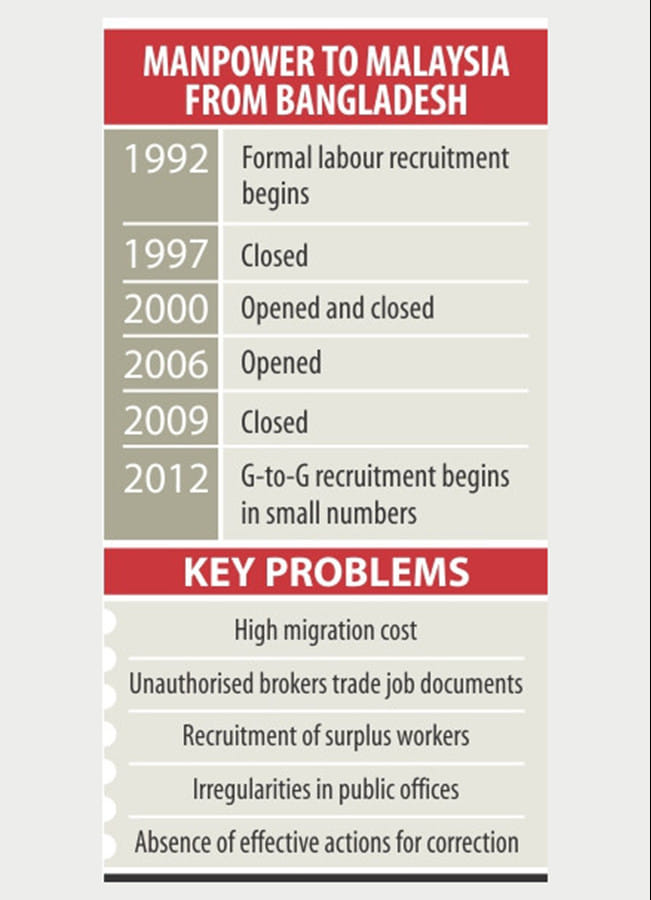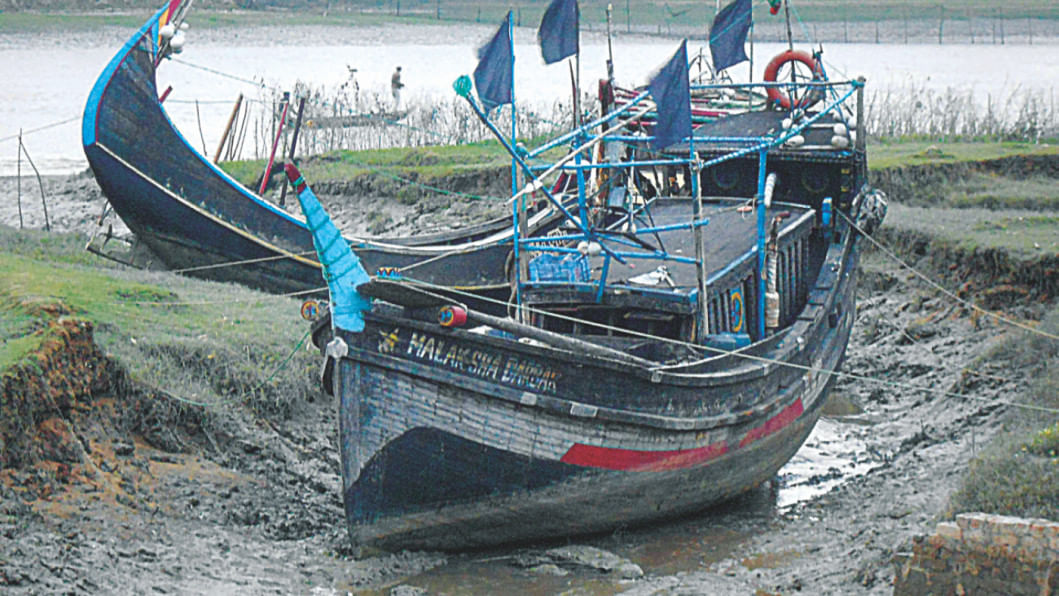Illegally driven as legally restricted
Emran Hossain and Mohammad Ali Zinnat did an extensive investigation into human trafficking from Bangladesh to Malaysia. For over three months, they did a thorough research, interviewed trafficking victims, brokers and rights groups, and travelled to the southeastern coastal areas before reporting on the clandestine crime that brings to mind the horror of slave trade of the past. The two apart, Porimol Palma and Belal Hossain Biplob tried to find out the reasons jobseekers are so easily lured into such a dangerous journey and the ways to fight the crime. Stay with The Daily Star as we uncover the modern-day slave trade of transnational syndicates in the Dark Triangle.
As legal channels for labour migration from Bangladesh have shrunk due to malpractices in the arrangements by both private agencies and the government, desperate jobseekers take dangerous sea route to Malaysia.
Dreaming of high-paid jobs, they fall prey to a third party -- transnational gangs pledging a secure sea voyage -- and end up in a vicious web of abuses including torture and captivity en route, forced labour or humiliating deportation.
Manpower export from Bangladesh to Malaysia has always been fraught with anomalies since it formally began in 1992.

Corruption by some Bangladesh high commission officials in Kuala Lumpur left as many as 50,000 workers illegal in 1996.
The Southeast Asian burgeoning economy had kept its doors closed to Bangladeshi workers for nearly a decade from 1997, except in 2000 when some 20,000 were granted visas. The migration resumed in 2006 and continued till early 2009.
Read all stories of "Dark Triangle" series-
- Slave Trade Booms In Dark Triangle
- Kidnapped, treated like slaves of past
- 'MALAYSIA AIRPORTS' in Teknaf
- Sailing off into hell
- Illegally driven as legally restricted
- One broker an upazila's woe
- Kidnapped, turned into slaves of past
"Such repeated closure or opening of Malaysian labour market was never the case for Nepal or Indonesia. But Bangladesh faced it mostly because of corruption," said Mohammad Harun Al Rashid, coordinator of CARAM Asia, a regional network of organisations working on migration and health issues.
Malaysia recruited some 8,000 Bangladeshi workers under a government- to-government agreement signed in November 2012 after a four-year freeze from early 2009. Under the arrangement, the migration cost was set below Tk 60,000.
The rate was Tk 84,000 when the private sector managed the recruitment in 2006 and early 2009. But studies found workers were charged higher, around Tk 2 lakh each, Harun told The Daily Star over the phone from Kuala Lumpur.
Brokers, human resources managers of employers and outsourcing companies and certain Malaysian officials are believed to have shared the extra money charged from the migrants.
Another source of their moneymaking was having workers way more than required, showing fake demands.
In 2007 and 2008, over four lakh Bangladeshi workers were sent but thousands of them remained unemployed or detained and finally returned home empty-handed.

Talat Mahmud, then labour counsellor of Bangladesh high commission in Kuala Lumpur, allegedly attested many documents without verifying job demands as he had good connections with the manpower brokers in Malaysia.
He was called back to Dhaka following Kuala Lumpur's cancellation of 55,000 work visas in early 2009.
Malaysia's immigration director-general Datuk Wahid Md Don was found guilty of accepting RM60,000 bribe for approval of 4,337 visa applications for Bangladeshi workers in Malaysia on July 10, 2008.
On October 30, 2013, the official was sentenced to six years in prison and fined RM3,00,000.
Now with the G-to-G arrangement in place, the flow of bribe money to brokers and officials has stopped, said a Bangladeshi recruiting agent having Malaysian business links.
"They now look to Nepal, India or Vietnam for workers," he said, requesting anonymity.
The recruitments from those countries are done through private sector, which in Bangladesh is plagued with irregularities for lack of regulating and monitoring.
Malaysian employers too are turning away from Bangladesh. They often complain of laidback attitude of government officials and bureaucratic tangles in the government-to-government arrangement, said Ruhul Amin, joint secretary general of Bangladesh Association of International Recruiting Agencies.
The agencies had talks with the government several times about the issues but things hardly changed, he said. "So, Bangladeshi jobseekers are going illegally," Ruhul added, pointing to the country's surplus labour and limited job opportunities.
Zaid Bakht, research director of Bangladesh Institute of Development Studies, said every year some 2 million youths join the labour force in the country.
Some 60 percent of them are absorbed into domestic and foreign labour markets. The rest remain either unemployed or underemployed; many often become desperate to find jobs abroad, even illegally.
Due to various irregularities by private recruiting agencies, Saudi Arabia imposed restrictions on Bangladeshi workers in 2008 and the UAE in 2012. Kuwait stopped taking Bangladeshi workers in 2006.
The three countries were the biggest job market for Bangladeshis.
Before 2008, between 50,000 and 1,00,000 Bangladeshis migrated to Saudi Arabia for jobs every year. Over the past few years, the number has come down to 5,000 to 7,000.

In case of the UAE, the number was about 1.5 lakh, which is now 10,000 to 12,000.
Many youths now want to try their luck in Malaysia that has annual labour shortage of some one lakh. One of them is Mohammad Yakub, 27, of Paikarchar in Narsingdi. He used to work at a power loom factory which often remained closed.
A broker pledged him a safe voyage to Malaysia and monthly Tk 50,000 income there, and Yakub decided to give it a try.
But en route, he landed in a Thai jungle. Held captive and tortured, ransomed and released and again jailed, he finally returned home in March this year.
His family had to pay a ransom of Tk 2.5 lakh for his release.
"We had to sell half of our four-decimal homestead and borrow the rest of the amount," said his mother, Sahera Begum, sitting at her hut at Kundapadi village.
"Our son has become too weak. After his return, he got a job at a local factory, but he cannot work hard as before."
Yakub at least managed to come back. But to determine how many lives were lost in the attempts requires further studies.

 For all latest news, follow The Daily Star's Google News channel.
For all latest news, follow The Daily Star's Google News channel. 

Comments